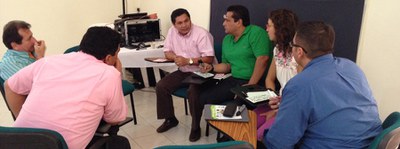Workshop with the Municipal Government of Neiva on FCMC's work in Huila, Colombia

A workshop with the Government of the Municipality of Neiva was held on Friday, April 25, 2014 as a part of the framework for the project Huila 2050: Preparing for Climate Change. FCMC is a partner in the Huila 2050 project, which aims to develop a climate change action plan for the Huila region of Colombia.
The workshop was entitled Prospective Workshop – Neiva 2050: Preparing for Climate Change and was designed with the goal of bringing together key people in the Government of Neiva to start thinking about how the city can become sustainable, resilient and climate-smart in the coming years. The city of Neiva is the capital city of the Department of Huila, Colombia. The municipality as a whole is home to about 350,000 people, accounting for a third of the population in Huila, and it is very important in terms of economic activity.
Mayor Pablo Hernán Suárez, as well as many of the directors of the different departments in the municipal government, attended the workshop. Carlos Cuellar, Director of CAM, the regional environmental authority, and the two sub-directors were also present. Additionally, other key stakeholders, such as the Director of Empresas Públicas de Neiva – the company in charge of providing water, sanitation, energy and natural gas services in Neiva – also attended. Their presence at the workshop was a great accomplishment, as it is very rare to bring together this group of people to think about the future of the city.
The event began with a series of presentations, which were meant to excite and inspire participants, as well as give them relevant information that they could use later in the working sessions. First, Claudia Martínez (Director of E3 and FCMC Huila project coordinator) spoke about the project Huila 2050, and Neiva’s relevance as a key player. Later, Alejandra Campo (Project Executive-E3 and FCMC) made a presentation defining and explaining vulnerability to climate change and describing some of the information generated as part of Huila 2050 about the vulnerability of Huila and Neiva.
These presentations were followed by María del Rosario Hidalgo (Director of the Sustainable and Competitive Cities Program of the national development bank, Findeter, and Inter-American Development Bank [IDB]); and Diana Lugo, who works in the climate change office of the Ministry of the Environment and Sustainable Development presenting on the Colombian Low Emission Development Strategies (LEDS) program and its possible actions at the city-level.
After the presentations, a group exercise in which participants had to think about problems and opportunities related to climate change for Neiva was carried out. The results were very interesting, as many groups had similar ideas regarding the problems Neiva faces in relation to climate change. The mayor had a brilliant intervention when he pointed out that Neiva has more opportunities than problems: It has sufficient water; has been growing at a reasonable pace; it is a safe city with very few complicated neighborhoods; it is attracting investment; it can still plan a good transport system; there is innovation in terms of housing projects for poor communities; and it has a lot of green spaces with more to come. A lot of emphasis was made on the importance of changing individual and social attitudes to face climate change and sustainability challenges. Also noted was the importance that Neiva is not seen as its own entity even though it is the capital of the Department of Huila, but must be viewed as a unit with its neighboring municipalities.
In the afternoon, an open discussion with a smaller group of participants took place around the next steps that should be taken. Participants were very excited to start working together in this matter, and the workshop was a strong first step towards building a sustainable, resilient and climate-smart Neiva. The Huila 2050 Plan will be launched in July 2014 as the first climate change plan at the departmental level in Colombia. For Neiva, having a sound regional plan under which it can start its own resilient city program will be an opportunity towards long-term climate compatible development.

